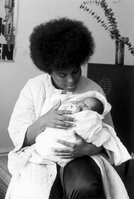-- Allen Dwight Callahan in "The Talking Book: African-Americans and the Bible.''
 By E. J. Dionne
By E. J. DionneWASHINGTON -- Great traditions are subversive. They constantly call the imperfections of the present to account in the name of a more exalted standard.
Abraham Lincoln marshaled the power of the Declaration of Independence to challenge slavery, and every year, the Christmas story overturns our daily understandings of power and privilege. A newborn king and savior appears among us, born to a most unlikely family, in a most unlikely venue, in the least promising of circumstances.
Callahan's remarkable book, published this year by Yale University Press, describes the rich and intense relationship between the Bible and the African-American imagination. But even more powerfully, it suggests -- without making the case directly -- that the reading of the Christian tradition offered by African-Americans is as close as any to the authentic meaning of Christianity.
Read more!

No comments:
Post a Comment